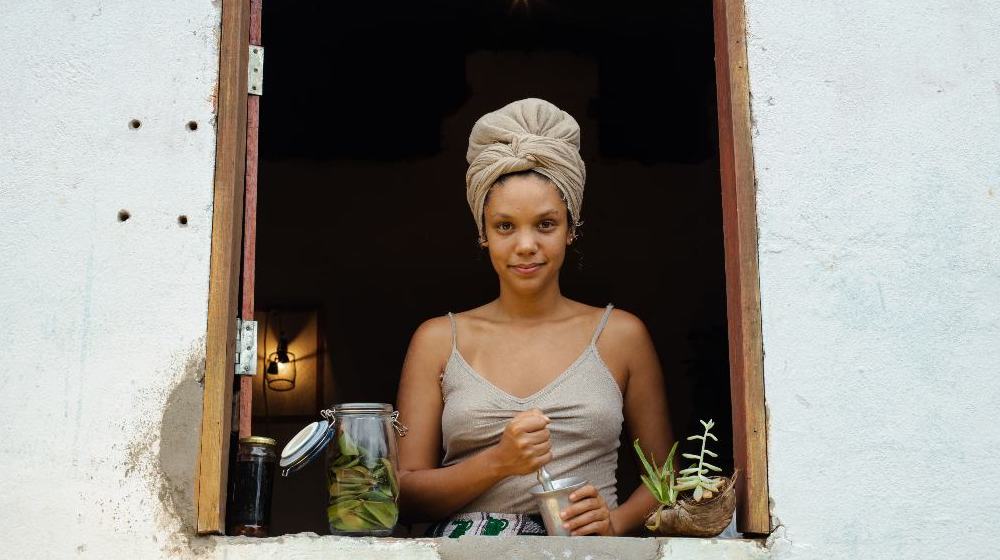
BAHIA STATE, Brazil – Carol was 21 when she left home in Belo Horizonte in search of a life purpose. She found it in Vale do Capão, in the rural community of Chapada Diamantina, where she formed Alevante da Terra (Earth Rising), a women’s collective.
When her collective co-founder had a child, she assisted in the birth and became a passionate advocate for safe and traditional childbirth practices. “For a long time, women who held traditional popular knowledge, such as benzedeiras [wise-women], midwives and curandeiros [folk healers], were recognized but not valued,” noted Carol, now 29 and an apprentice after taking midwifery and natural childbirth courses. To her, assisting births is “the ecstasy of life. That’s when I feel most present in the world, most deeply connected. It is as if a new portal has opened.”
She runs a project educating women and girls on caring for their bodies, one of eight projects UNFPA supported along with the Elas Fund to empower Bahian women community leaders. The projects are part of the “Driving Force” initiative and have collectively reached more than 3,000 people between the ages of 12 and 96. Women are the driving force for change in their communities.
Brazil’s Driving Force projects focus on women’s health, mothers, and other issues recognized by UNFPA in May.
Mother’s Day and International Day of the Midwife in Brazil
This month, dozens of countries including Brazil celebrate Mother’s Day. And 5 May is the International Day of the Midwife. In addition to Carol celebrating midwives and women’s health, religious leader Mameto organizes “Matriarchal Leaders: The Power of the Yabás and the Life-Generating Force.” Drawing on the matriarchal wisdom of Yabás, or female Orishas (goddesses), she hosts a terreiro (place of religious worship for Afro-Brazilians) in Salvador where cis- and transgender women learn about self-care, reproductive health and their bodies. “Women need to have autonomy, be empowered and perceive their capacity,” said Mameto, 52. She sees her work as a kind of motherhood. “I am a mother of more than 70 daughters, and this is wonderful.”

International Day of Families
The 15th of May is the International Day of Families. Families should be a place of protection and support, but they are too often the source of abuse and injustice. Luzitânia Silva, 31, experienced domestic violence in her childhood in Presidente Tancredo Neves. She used storytelling to work through her trauma and today encourages others to do the same. Aimed at teenagers, her “Empowering: The Choice is On the Girl” project conducts creative writing workshops, delivers lectures and facilitates conversations on female empowerment.
International Day Against Homophobia, Transphobia, and Biphobia
On 17 May, the world observes International Day Against Homophobia, Transphobia and Biphobia. Patricia Santana knows the oppression of being a poor Black female lesbian. Her Lesbi Saúde (lesbian health) caravan project brings sexual and reproductive health information to LGBTI people across six Bahian municipalities. She has heard countless stories of neglect, discrimination and even death. “Our lives and our health are not a priority,” said Patricia, 37. “Maybe this is the revolution.”
International Day to End Obstetric Fistula
The International Day to End Obstetric Fistula takes place on 23 May. Obstetric fistula, a traumatic childbirth injury, occurs when vulnerable women lack access to skilled delivery care. Young bodies not ready for pregnancy and childbirth are particularly at risk. This injury can be completely prevented by empowering women and girls to delay motherhood and access skilled sexual and reproductive health care. Samaha in Itacaré aims to do both with her “Yes, We Can!” project, which focuses on preventing adolescent pregnancies and helping young women escape abusive relationships.
Tragically, Samaha experienced both early pregnancy and extreme marginalization as an abuse survivor. “With every girl and woman I help, I feel like I’ve healed a little,” said Samaha, 36. Sueide’s project also helps marginalized individuals take control over their bodies and health. “This Body is My Body” shares messages on television and social media about human rights and health care. “We are talking about people who have had their uterus removed because they had no information about proper care, people who suffer abuse and rape and blame themselves for it,” said Salvador-based Sueide, 36. Dina Lopez’s television segment “Conversa de Preta” (Black Talk), similarly brings sexual and reproductive health information to some three million viewers. “We have to use this power to decide our own lives,” the 55-year-old educator said.
Menstrual Hygiene Day
Finally, Menstrual Hygiene Day takes place on 28 May, a rare opportunity to call the world’s attention to issues that are an unspoken reality for billions. Lara Carvalho, 28, wants people who menstruate to know their bodies. “I’m talking about understanding how our body works and our cycles,” she said. Her Nossos Ventres (Our Wombs) project focuses on spreading knowledge of sexual and reproductive health. The project uses documentaries, podcasts, and free e-books to share information on menstruation, sex, and pregnancy.
For people in Bahia expanding their knowledge about sexual and reproductive health and rights, these Driving Force projects opened new portals. Mother’s Day celebrations in Brazil are one way to recognize this important work.
UNFPA.org originally published a version of this story.